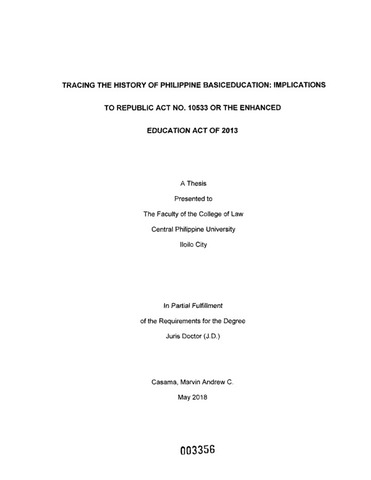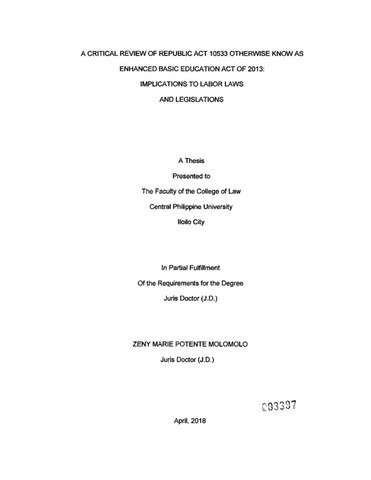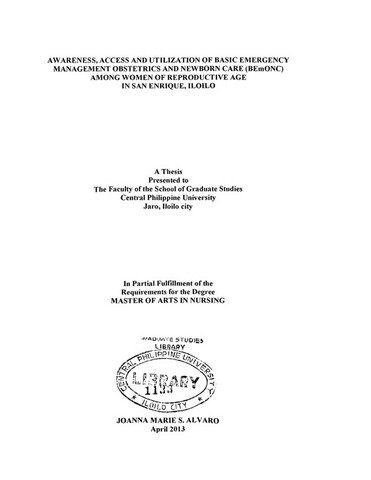Tracing the history of Philippine basic education: Implications to Republic Act No. 10533 or the Enhanced Education Act of 2013
요약
This qualitative study is aimed to trace the History of Philippine Basic Education with implications to the Enhanced Education Act of 2013. It is also aimed to determine the possible effect of the MTB-MLE implementation in schools. Qualitative Historical research and Content analysis were used in this study to determine the changes that happened overtime to the Philippine Basic Education. The researcher followed five steps in applying Historical Research as method for this study. Result showed that there are a lot of changes in structure and education itself in the past century in the history of Philippine Education. As for reference, the researcher used the country of Vietnam as a model for this research as the history of their education is closely related to that of the Philippines, they just reformed earlier, as the Philippines reform came about 20 years after. During the 19th century, Spain was the first to decree education reform in the Philippines, it was followed by the Americans and Japanese, thus, our basic education system is influence by three cultures, the Spanish, American and Japanese. Each of the occupants had their own system of education implemented, which the Philippines was able to adopt. Just recently, in the year 2000s, there two major reform in Philippine Basic education. First, was the inclusion of kindergarten as part of the basic education in the Philippines by making it mandatory before entering grade 1. It can also be concluded that the enactment of Enhanced Education Act of 2013 is prompted by the provision of the Constitution. The poor educational standard in the Philippines, contributed to transform the Philippine Basic Education same with other countries, adopting the k-12 system. However, the biggest factor of the reforms in education was not statistic nor the growth society, but, in can be inferred that these reforms was because of the current administration the Philippines had during the changes. In the Pnoy administration, there are at least 6 laws passed with changes or added something with the basic education, the major changes were the mandatory kindergarten through Kindergarten act of 2011 and the increase of basic education years from 10 years to 12 years through the Enhanced Education Act of 2013. The major reform in the Philippines was as can be seen by the peoples naked eye, as the government failed to show the reason for these changes. The public had a notion that these changes was due only to the fact that other countries have K-12 system, but they failed to see the reasons, statistically, that our basic education system is not working for the improvement of students. Recommendations were made specifically to improve facilities through the increase of funding for education, specifically, the spending per student because Philippines has the lowest spending per student in the Southeast Asia.
기술
Abstract only
추천 인용
Casama, M. A. C. (2018). Tracing the history of Philippine basic education: Implications to Republic Act No. 10533 or the Enhanced Education Act of 2013 (Unpublished postgraduate thesis). Central Philippine University, Jaro, Iloilo City.
유형
Thesis주제
학과
College of Law정도
Juris Doctor선반 위치
Law Library 340.72 C263
물리적 설명
vii, 74 leaves
Collections
- Juris Doctor [144]
다음 라이센스 파일이이 항목과 연관되어 있습니다.
Related items
Showing items related by title, author, creator and subject.
-
A critical review of Republic Act 10533 otherwise known as Enhanced Basic Education Act of 2013: Implications to labor laws and legislations
Molomolo, Zeny Marie P. (2018)This study is a content analysis entitled “The Implication on Labor Laws of RA 10533 (The K to 12 Program).” RA 10533 and its Implementing Rules and Regulation (IRR) were deeply analyzed and focused mainly on finding the ... -
Awareness, access and utilization of Basic Emergency Management Obstetrics and Newborn Care (BEmONC) among women of reproductive age in San Enrique, Iloilo
Alvaro, Joanna Marie S. (2013)Women’s utilization of maternal health care facility is an important health issue with regard to the wellbeing and survival of both the mother and her child during childbirth. There are certain factors however that inhibit ... -
Library competency of the basic education learners: a basis for the development of the K to 12 library instructional program of the University of San Agustin
Labrador, Edmar (2014)This is a qualitative-quantitative descriptive study to determine the factors associated with the level of library competency in terms of knowledge and skills of the 209 pupils of the University of San Agustin - Basic ...






